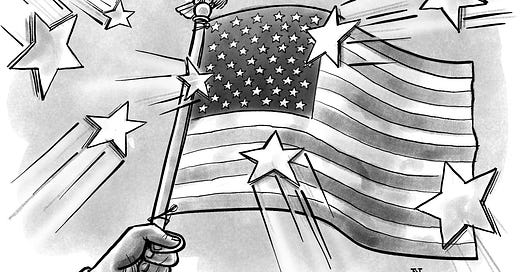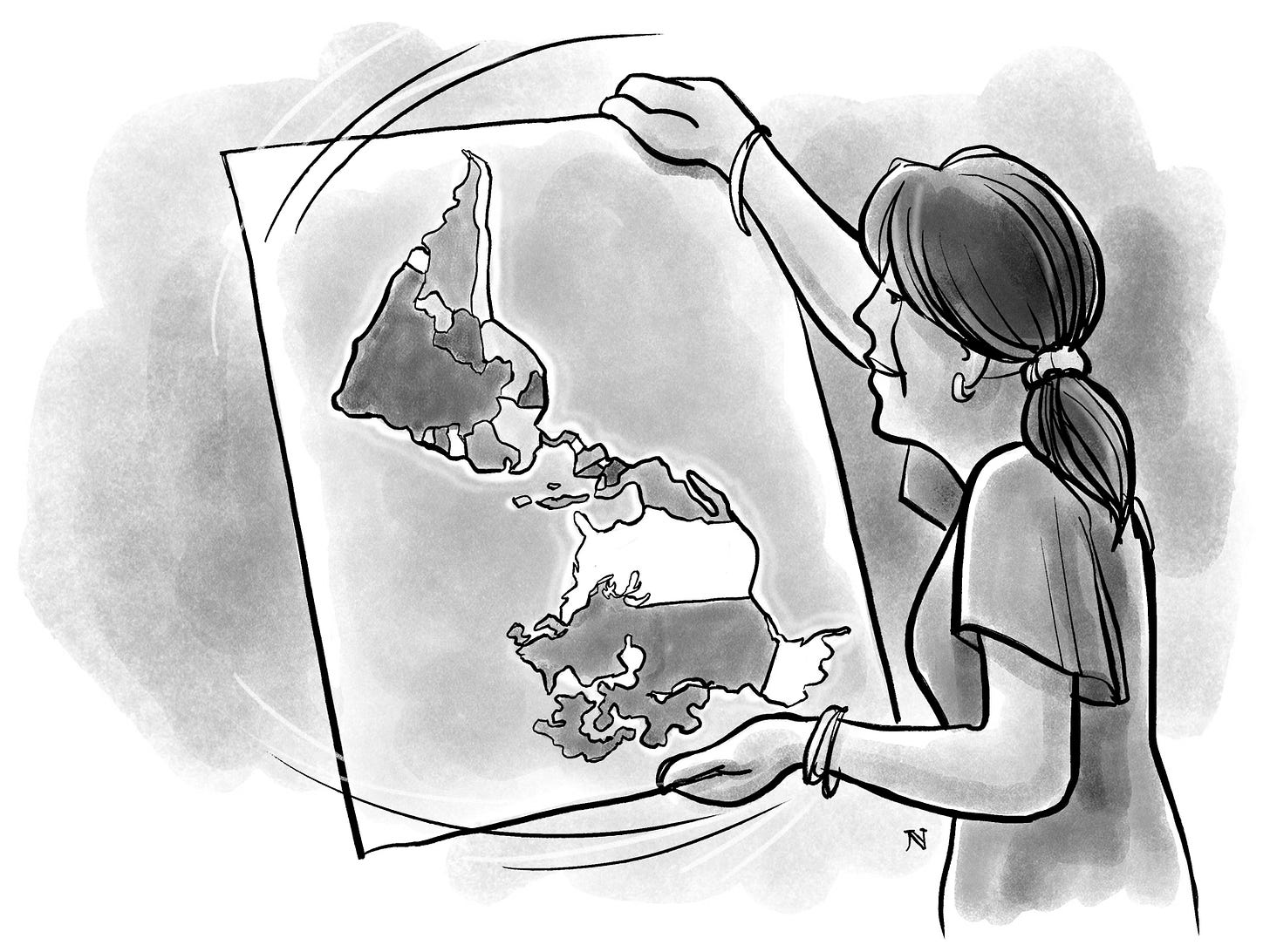What "America's New Map" says about expanding membership in an American Union
Canada, Greenland, Panama are all suddenly in the news, thanks to Trump
On Canada:
Considering just how strategically important the Arctic North will become, along with how much more climate change will reformat Canada than the United States, there are solid arguments for the two to seek genuine union. Canadian journalist Diane Francis, author of Merger of the Century: Why Can- ada and America Should Become One Country, argues for the inevitability of this political development:
If the United States and Canada were corporations, or European states, they would have merged a long time ago. Each has what the other needs: The United States has capital, manpower, technology, and the world’s strongest military; Canada has enormous reserves of undeveloped resources and ownership of a vast and strategically important Arctic region.
Canada plus America would be the perfect twenty-first-century super- power, securing control over, in Francis’s words, “more oil, water, arable land and resources than any jurisdiction on Earth.” Each would make the other that much more powerful while together fielding a supremely attractive global brand. The most plausible path? A straight-up business merger not unlike that of East and West Germany. In grand strategic terms, I cannot imagine a smarter US move this century—whatever the cost. I mean, Alaska worked out, did it not?
Both the United States and Canada, along with Northern powers world- wide, will need to engage in such radically pragmatic strategizing as climate change remaps our planet. Instead of viewing this global transformation as triggering imperial or “White man’s” burdens, we need to recognize it as opportunity—as in, what can America get out of this? How do we collectively define “winning” and what will be required to achieve it? America will exit this tumultuous era either bigger and stronger or smaller and weaker. As homeostasis is unachievable in human affairs, there will most certainly be winners and losers. Presently, America is on track to lose—an outcome unacceptable to any who truly love our nation.
On the hemisphere in general:
Climate change forces a shotgun wedding between Anglo and Latin Amer- icas. The way to make it work is not by mass immigration but state assimilation into a larger American Union.
In his 2020 book, US liberal journalist Matthew Yglesias made the case for One Billion Americans through (a) more vigorous public- and private-sector support for larger families, and (b) reform of the US immigration system to accommodate a far larger inbound flow. Aggressively expanding the US pop- ulation, he argued, would help us keep up with rising China—a country our equal in territory.
Right instinct, wrong path.
We do not need to overstuff America to match China and India’s economic demand signal; we simply need to grow these United States—a political pro- cess that is, on paper, surprisingly easy and straightforward. Per the US Constitution (Article IV, section 3, clause 1), all it takes is the applying political entity to hold a popular referendum, typically triggering Congress’s request for that entity to draw up an acceptable constitution. Once both sides approve the devised ruleset, Congress passes a resolution thereupon signed by the president, who proclaims the new state and orders an updated flag for the next Fourth of July. The reason our ruleset is so simple is that we spent most of our history rapidly admitting members. It is how we built the United States and what it is built for.
The Western Hemisphere holds one billion souls now. We do not need to invite more people in; we just need to actualize what we already share—two resource-blessed continents and a blended hemispheric culture decidedly advantaged for the tumultuous, transformative, and trying decades ahead. Eventual statehood is the lure, but anything short of that still places us collectively on a path that is a soft-power success unto itself. The journey is everything, so long as we engage this process with open hearts and minds.
Understand, this is not a path where America simply gets what it wants, but one in which the rest of the Americas get what they deserve—namely, the preservation and expansion of the hemisphere’s burgeoning-but-vulnerable middle class amidst climate change’s tectonic reshaping of our shared environment. Democracies live or die with their middle class. The same will be true of this expanding American Experiment: America wins or loses in concert with our hemisphere.
Likewise understand that this is primarily a defensive US grand strategy. America’s superpower competitors will similarly experiment in ways that— from today’s immediate perspective—are inconceivable. But climate change already redefines our sense of what is conceivable and inconceivable within our lifetimes. The Anthropocene beckons. We should pay attention less out of the threat generated than out of the opportunities afforded, because we will live in a far different world located on the far side of this transformation.
Powers both great and small will be forced to try all sorts of economic, security, and political schemes to avoid, or at least mitigate, Middle Earth’s depopulation over this century. If Northern states want to avoid uncontrollable migrant flows, then we need to construct and extend channels of aid and investment designed to expand social resiliency across Middle Earth. We can attempt that primarily as intervening external powers, but that limits our ability to make sure money and resources are well spent, yielding downstream success—and profits. We are likely to do better when we formally link those capacity-building efforts with those states’ progress toward deeper membership in shared economic and political unions. That promised extension of economic security by superpowers will constitute the twenty-first-century equivalent of a nuclear umbrella—as in, step under our protection and plan your economic future with confidence. This is essentially the EU’s “carrot” of accession and what China promises with its Belt and Road Initiative, which, despite Western criticism, consistently delivers local economic growth among its lower-income partner states.
America cannot compete without a similar offering, meaning we picked the worst possible moment to go all nativist. The fact that the UK picked a sim- ilar moment to do the same only proves just how mistaken we are to continue that “special relationship.” London’s days of mentoring anybody are long gone.
In all these arguments, I do not ask you to consider this pathway because it is progressive, cool, or visionary; I am telling you that America will inevitably attempt such integrating schemes out of necessity and even desperation.
That being the case, we need to start this conversation now. Americans have long argued that it would be better not to burden our military with so much of our foreign policy agenda. This would be a path of lightening that load, de-militarizing our foreign policy, and enlisting a truly Whole of Government approach to our long-ignored hemisphere. It would also represent a US grand strategy far more likely to engage our younger generations.
Finally, we need to gain some perspective on the challenges ahead, as there are crucial questions yet to be systematically addressed:
★ How many people across Middle Earth will be put on the move?
★ How many can we in the North practically hope to maintain in place?
★ Of those put on the move, how many can and should Northern states accommodate?
★ How many Middle Earth nations will suffer state failure?
★ Of those that do, how many will be salvageable with outside help or extended forms of belonging in larger unions?
★ How many will be unsalvageable, and what should we do with them?
The list goes on and on.
America’s foreign policy establishment will invariably scoff at the notion of preemptively engaging Latin America along these ambitious lines, citing those regions’ long-standing back-burner status. Within the national security com- munity, there will always be some overseas crisis deemed more worthy of our focused attention. That is because too many of them still think of the United States as a peerless global hegemon facing a handful of “near-peer competitors,” when the truth is, America itself has slipped into the near-peer ranks in most domains—save hard military power and soft brand power.
In response, I am again compelled to inquire: If not the Western Hemisphere, then where better to lock in our status as the regionally integrating force of note? Is anyone under the impression that America can steer Asia’s future integration more than China? Manage Russia’s long-term relationship with Europe more than Europe itself? Ensure the Middle East’s stability more than primary customers China and India? Or even regional hegemons Israel and Saudi Arabia? Finance Africa’s massive urbanization processes more than that continent’s de facto World Bank, China?
It is not pie in the sky to advocate that the United States concentrate on leading its hemisphere’s economic and political integration. Rather, it is all that is left on our plate in terms of realistically pooled sovereignty. It will not get any better than that, and nothing beyond is feasible until we achieve it. America can most definitely say no to this ambition, but none other is in the offing— nor even remotely on target for the threats, crises, and opportunities that will dominate our nation’s future. Moreover, the longer we delay action, the more inevitable this task becomes in the face of our competitors’ encroachment. We can neither run nor hide away from this future. It is already baked in, much like climate change.
Consider the choice from the opposite angle: Is there anything in the global scenarios presented here that suggests it will be better—or more realistic—for less-developed and emerging economies to navigate these turbulent decades by going it alone versus pooling their sovereignty (and risk) within multinational unions anchored by a like-minded superpower? Channeling the fictional detective Sherlock Holmes, when you have examined the inevitable, then whatever is revealed, however inconceivable, must be the truth. The truth here is that the supreme collision of climate change, an ascendant global middle class, and demographic collapse compels governments—North and South—to seek expanded and accelerated integration as a means for state survival and advancement across this century, the most structurally transformative period our world system has yet encountered.
To reject this challenge is to condemn your state to one or more forms of sovereign bankruptcy—political, economic, or security. This truth should shock no one in our United States, as none of our members would today enjoy more than a fraction of the wealth, power, and freedom afforded by our Union if they, in a fit of pique, were to exit. Without the logic and benefits of integration, our Union does not exist, which is why a grand strategy centered on that purpose is self-evidently—and entirely—American in nature. It is simply who we are.
The baseline economic arguments for undertaking this grand strategy are straightforward: Latin America and the Caribbean suffer from low levels of regional economic integration, as does the Western Hemisphere as a whole.
There is good money to be made there, particularly as our business community instinctively turns toward nearshoring strategies in response to the global economy’s recent and ongoing tumults.
Latin America possesses the natural and human resources but often lacks sufficiently developed economic, political, and legal infrastructures, the upgrading of which should comprise the bulk of our Union’s accession-credentialing process. As the editorial board of the Washington Post recently noted, the United States “must understand that the institutional challenges facing Latin America are not altogether unlike the ones confronting this country, with its own grow- ing distrust of elites and multiple threats to democratic stability.” Point being our nation-building journeys presently overlap—just as they often have.
Right now, the Chinese offer Latin America and the Caribbean hard infrastructure at low cost in return for management leases on the resulting facilities, along with attached sales of their social control technologies. If your country is lucky, the Chinese will not get too pushy as your government falls deeper in their debt (consider, for example, Ecuador), but there is no path forward to a stabilizing, empowering, or liberalizing membership in a larger China-led eco- nomic or political structure. China’s dream is its own; your state can contribute to it but cannot partake of it.
A good example of this lopsided negotiating is Beijing’s 2022 security agreement with the Solomon Islands—a deal that “allows both sides to main- tain social order and protect lives and property in the South Pacific archipel- ago.” Nice hegemony if you can get it, and a real shocker to the United States and its local allies.
Now imagine something more shocking but in the other direction, such as Washington and Manila initiating negotiations over the Philippines’s multi- ple candidacies for US statehood. Inconceivable for a former US colony with a population of 100 million and an economy the size of Wisconsin? From today’s perspective yes, and yet, contemplate how nations around the world might play that diplomatic card against an increasingly assertive China in the decades ahead. All we have to do is shuffle the deck and start dealing.
Emerging markets represent globalization’s frontier, as in, economies that need to become firmly settled in global value chains—whatever their practi- cal length. America’s history of growth is one of integrating frontier econo- mies, whether it was our Wild West, the nascent post–World War II West, or today’s rapidly privatized space industry. Our model for such integration is so powerful that its major aspects now define globalization’s core processes, making it the most impactful soft power we wield.
What is most challenging for US foreign policy right now is coming to grips with the reality that, in the superpower brand wars of this era’s global- ization, our integration offering is inferior to those of our prime competition— today, China and the EU in the economic and political realms, respectively. That reality can trigger a crisis of confidence; it can also feed our growing exis- tential dread.
What it should do is humble us sufficiently to conceive of a better way for- ward, one in which we boost our attractiveness to other states, solicit their free association, financially incentivize their emulation, and accept their application for new membership in our growing and still-history-bending Union.
Our message to the world—but especially our hemispheric neighbors— must be: Let us go forward in union.







I think there’s a lot of things that frustrate me about Trump and his relationship to his followers, but it’s articles like this that really drive a point home.
It’s clear the author of this article is smart, realistic, intelligent, and writes a compelling argument. Honestly, the author probably knows more about foreign policy than me.
But Trump doesn’t care about foreign policy. He’s a collection of impulses to make jokes and memes to satiate a base that seems to have no real clear policy goals outside of spite and humiliation of their opponents. No one was talking about annexing Canada on the campaign trail at all. But now Trump said it, so the conservative world has to hastily put together arguments on why this was a stroke of genius all along. And maybe it is? But too much of the intellectual conservative movement reads as a tail being wagged by a dog.
Does Trump ***really*** want to annex Canada? No. What he wants is for people like me to say “That sounds terrible and unrealistic”, and then someone else to say “Stupid lib”, and then post a link to this article like a drunk man groping at a breast, where he neither grasps it cleanly and the owner of the breast (you, the author of this article,) realizes it was not grasped well at all.
" homeostasis is unachievable in human affairs, " finite resources competed for in a finite space. As you have described elsewhere, salesmen will claim neither is finite. Boltzman told us how that resource competition plays out. And then he killed himself. Somewhere between Boltzman and salesmen is strategy.